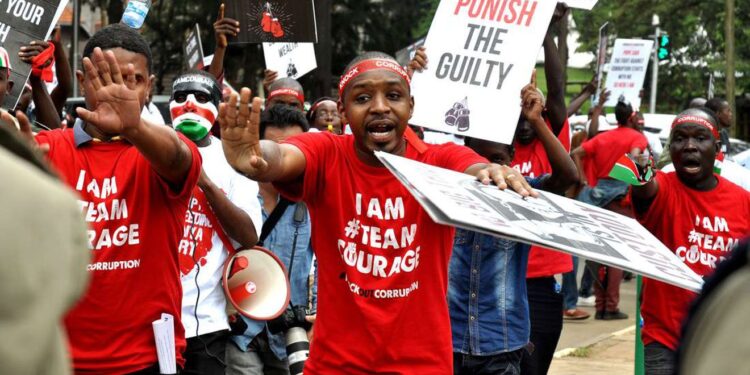
Activism in Kenya
Activism in Kenya: Its Pros, Cons, and the Impact of Boniface Mwangi’s Detainment
Activism has been a powerful catalyst for social change in Kenya, with activists like Boniface Mwangi bringing critical issues into the spotlight. From advocating for democracy, human rights, and accountability, to addressing social inequalities. Kenyan activists have challenged institutions, governments, and policies. However, as the case of Mwangi’s recent detainment demonstrates, activism in Kenya comes with both its benefits and its challenges. Most often accompanied by controversial encounters with authorities. This blog delves into the pros and cons of activism in Kenya, its impact on society, and the ongoing support for activists like Mwangi who continue to push for transparency and justice.
The Role of Activism in Kenya
Activism in Kenya plays a central role in highlighting societal issues and advocating for solutions. From grassroots organizations to high-profile individuals, activists bring attention to issues such as corruption, police brutality, environmental degradation, and social justice. This is evident in campaigns led by groups like the Kenya Human Rights Commission and Amnesty International Kenya. Notably, as well as individual figures such as Mwangi, who has fearlessly spoken against government corruption and police violence.
Through protests, social media campaigns, and rallies, activists inform the public and mobilize citizens to hold the government accountable. Activism has also facilitated legal and policy changes, pushing leaders to reconsider policies and practices that violate human rights. Nonetheless, the benefits and challenges that come with activism remain multifaceted.
Pros of Activism in Kenya
- Increases Accountability: Activism shines a light on corruption and government malpractice, forcing leaders and institutions to address these issues. For instance, campaigns against police brutality have exposed rogue officers and led to increased scrutiny of police operations.
- Promotes Social Awareness: Activists educate the public on issues like poverty, gender inequality, climate change, and governance. Public understanding of these issues empowers citizens to demand better services and equal rights, creating a more informed and engaged society.
- Encourages Policy Change: Activists in Kenya have successfully influenced several policy changes. For example, campaigns against police brutality have led to reforms in how law enforcement officers interact with the public, while others have led to more stringent anti-corruption measures.
- Strengthens Democracy: By encouraging free expression and civic participation, activism plays a fundamental role in strengthening democratic values. People feel more empowered to speak out, vote, and participate in decision-making, contributing to a fairer, more representative society.
- Drives Social Justice and Equality: Activism has been instrumental in pushing for social justice reforms, including LGBTQ+ rights, gender equality, and minority rights. The Kenyan feminist movement, for instance, has made significant strides in advocating for women’s rights and reducing gender-based violence.
Cons in Kenya
- Risk of Government Retaliation: The Kenyan government has historically resisted vocal opposition, leading to arrests, threats, and detainment of activists. Boniface Mwangi, one of Kenya’s most notable activists, was recently detained at Kamukunji Police Station following his call for a protest. Such detainments aim to discourage activists but instead spur more awareness and support.
- Personal and Professional Risks: Many activists risk their livelihoods, and their families may face harassment. Activism often puts a strain on personal relationships and careers, as activists spend significant time and resources advocating for change.
- Public Misinformation and Polarization: Activism can sometimes lead to misinformation, especially on social media platforms where false narratives can spread. This polarization can divide the public and weaken the message activists intend to share.
- Stigmatization: Activists are sometimes stigmatized as troublemakers, which can lead to a lack of support from society. Despite their role in advocating for justice, some activists are branded as anti-government or even criminalized, discouraging others from joining the cause.
- Dependence on Funding: Activism often requires financial support for mobilization, legal fees, and safety measures. Dependence on donor funding or foreign support sometimes leads to suspicion, with claims that activists are driven by external interests, undermining their credibility.
Boniface Mwangi: A Case Study of Activism’s Impact in Kenya

Above, Boniface Mwangi, a prominent Kenyan activist, is an influential figure whose campaigns highlight the challenges and achievements of activism in Kenya. Known for addressing issues like corruption, extrajudicial killings, and environmental degradation, Mwangi has used his voice and influence to challenge authorities. Recently, Mwangi was detained by police during a marathon protest, sparking widespread outrage and calls for his release from leaders and activists alike. He was traced to the Kamukunji Police Station, a situation that has since mobilized human rights groups and supporters demanding transparency and accountability from the police.
Mwangi’s detention highlights the risks activists face and the resilience required to pursue justice. Despite being temporarily silenced.Moreover, Mwangi’s arrest mobilized greater support from the public and further illuminated the issues he was fighting against. As Mwangi’s case shows, activism in Kenya is a high-stakes pursuit but one that amplifies the voices of those unable to speak for themselves.
The Future of Activism in Kenya
Activism in Kenya has brought significant attention to issues of corruption, police brutality, and social injustice. Figures like Boniface Mwangi remind Kenyans of the power they hold in demanding accountability from those in authority. While activism has its risks, the benefits are vast, and the legacy of activism in Kenya is rooted in a desire for justice, transparency, and equality. As the country grapples with various social and political issues, activism will continue to shape its future. Thus, offering a voice to the voiceless and pushing for a Kenya that upholds human rights and democracy.





